The Culmination of Mastery and Community: Senior Exhibitions at the Parker School
CompetencyWorks Blog
“There are many ways that this ends up being one of the weeks we take away from the whole year that feels so culminating and so representative of what we are trying to get at all the time. And this week it just shines through all those kids in a lot of great ways.” – Parker Senior Advisor Jim Desmond
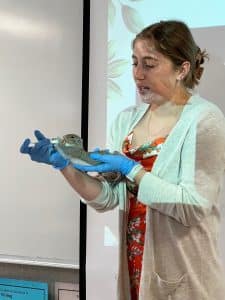
Presentations of learning capture the spring bounty from a school year of learning. From senior exhibitions to student-led conferences and portfolio defenses at all age levels, they create spaces for reflection to bring greater awareness to what a student has learned, where they have grown, and where they still continue to grow. Last week (and also in May 2023), I served as a community juror for senior exhibitions at the Francis W. Parker Charter Essential School in Devens, MA. Parker is designed around the Coalition of Essential Schools Ten Common Principles and serves around 400 students in grades 7-12.
Each jury panel includes one or more community members, the senior’s advisor, a faculty member, and a current junior. The panel assesses the presentation using a rubric focused on the content and the quality of the presentation.
Senior Project Presentation as a Student-Driven Culmination of Learning
Students have autonomy over their senior project topic and process. John Bohannon, a Math, Science, and Technology teacher and senior advisor, shares, “This is the culmination of their six years, and it’s incredibly personal. The students make of it what they’re ready to make of it. We have the expectations and things that they’re supposed to do and the rubrics, and then they’re going to do with it what they as students are capable of, motivated, and interested in doing.”
The five presentations that I served as a juror for (in May of 2023 and 2024) offer a glimpse into where students decide to take their senior projects.
How can machine learning solve complex problems?
Jonah went deep into an intellectual and technical senior project incorporating mathematics, programming, and music. His goal for his product involved designing a machine learning program that created original classical music that was recognizable as such. Jonah guided the audience through complex topics – sometimes beyond my full comprehension – and connected insights on his own learning to the topic at hand. He spoke about the importance of depth over breadth and of being able to navigate unknowns in his own process, even as he shared a moment when his program decided that the “safe thing to do was not to play anything” and he needed to keep troubleshooting.
How can someone manage depression?
Another student focused on a question very personal and relevant to him. He shared, “I chose this because it’s something I have struggled with and something that I genuinely want to really think about using in the rest of my life.” Self-inquiry provided a key modality, but he also conducted research to inform his own experiments.
How can I learn and use the skill of leathercraft to make armor?
Griffin chose a topic related to a hobby that was very tangible. His takeaways ranged from insights related to perfectionism, time management, and motivation to how to adapt his design to allow the mobility needed for using his armor in a Dungeons & Dragons context.
How can I learn and utilize American Sign Language as a hearing person?
Rose opened her presentation using ASL. The audience learned about the history of ASL and gained new perspectives on the historical figure, Alexander Graham Bell, whose wife was deaf and who advocated against ASL because he believed that speaking should be the primary and ultimate goal. Rose learned through interviews, working for a designated night for deaf families at her job at a children’s discovery museum, and even by taking a dance class taught in ASL.
What can documentary film reveal about the human condition?
Neva guided us along her journey through her search for a definition and framework of the human condition. Her inaugural documentary film told the story of a childhood friend navigating high school as one of few Black students in a mostly white suburb, who ends up pursuing and winning an NROTC scholarship, to eventually become an officer in the Marine Corps.
“The Ultimate Demonstration of Mastery”
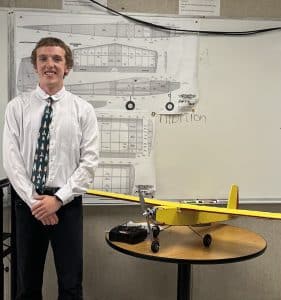
Senior project is a graduation requirement supported by a year-long senior seminar that Parker students take in their final year. The project is aligned to the Parker Habits of Success, the skills-based competency framework of the school.
Debbie Osofsky, a senior advisor, explains, “It is the ultimate demonstration of mastery in a lot of different ways. It is mastery in terms of their Parker experience of building the skills and habits to be an effective learner and to be a good person. But it’s also the specific demonstration of mastery of this topic that they’ve chosen completely on their own. They show how they crafted a process to get to where they ended up in terms of their research, their experiential learning, their collaboration, and in their product.”
Jim echoes this sentiment and adds, “That’s what we’re hoping for here. We use the word ‘mastery’ when we talk about senior exhibitions and for the senior project in general. It’s getting to that level of knowledgeability that you have reached what, at least at a high school level, we can say is mastery of that topic.”
Ella, a junior who served as a student juror, reflected on the power of rubrics in moving towards mastery, saying, “I feel that Parker really raises you to be critical, but not in a bad way. Critical thinking – it’s one of our habits of success – is something that I think I’ve grown a lot in and that I’ve seen others grow a lot in that skill.” She explains further:
“I feel like I’ve been raised on rubrics, almost. The switch from grades to rubrics was something that was really jarring those first few years because grades feel so sedentary. You get something and you can’t move it. There’s nothing you can do about it. But with rubrics, you feel like there is so much growth. It really changes your mind on your academic experience, but also on your personal experience. It really instills in you that sense that, ‘I have a chance to grow. I have a chance to learn.’
It really teaches students about growth, rather than, ‘Oh, gosh, I got a D on my test.’ Alright, so, what did you learn on that test? What can you continue to learn? Rather than, ‘Oh well, I’ll just memorize and forget about it.’”
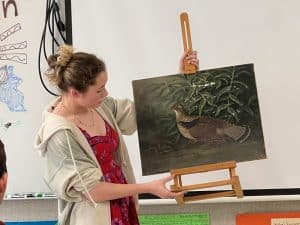
Students care very much about their presentation and take it seriously, even though their rating on the presentation itself will not factor into a grade. Unlike most assessments at Parker, which tend to be authentic applications through performance assessment, students don’t have the opportunity to redo or revise their presentations. They must do the presentation, but they can decide whether they want to get a final overall evaluation of their level on the rubrics or not (either way, they get the feedback from the jurors). The foundational learning and product of the senior project can be revised and must meet the required standards in order for a student to present. One advisor shared that two students in their advisory group weren’t presenting in the designated four days because their project wasn’t at the point where they were ready. In this sense, Debbie explains, “Truly this is performance on demand….You’ve been working to this point and it’s gonna be what it’s going to be.”
Celebration and Cultivation of Community
In many ways, big and small, the design of senior exhibition week builds community and shows students, staff, and the community a vision for the “Parker Way.” It makes the learning culture visible and known to the people in the building and beyond. In addition to the purpose it clearly serves for students, Debbie notes that, “It’s also really important for our community. Every teacher gives up at least one two-hour block of planning time in order to be on juries. We have community members come in to give an outside perspective on what high school graduating seniors should be able to do.”
It is a culminating week for the whole year. Though it didn’t start as such, now the schedule changes for the whole school, allowing younger students to gain insights about the senior experience. Division or “Div” I (grades 7-8) and II (grades 9-10) students get to sign up to be audience members, and for Div III (grades 11 & 12) there are no other classes so that students can support and attend their peers’ presentations and the celebrations that follow.
Students take their responsibility as audience members and supportive peers seriously. After one exhibition, Jim noted, “You noticed how amazing the audience was. You could hear a pin drop the entire time. They were with her every moment. They built the skills as listeners, as participants, to be really present and be appreciative audience members.”
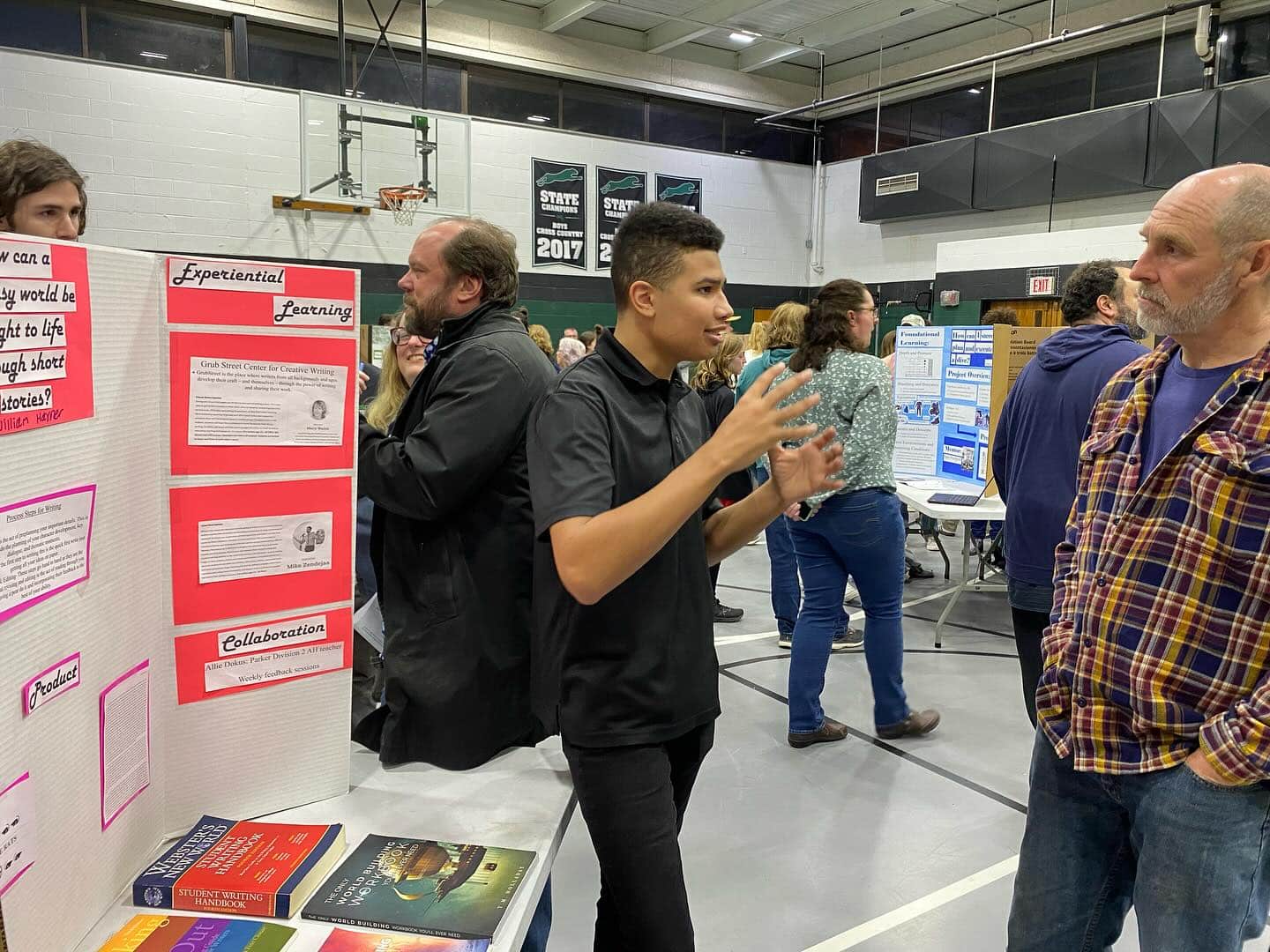
Getting to the Destination Via Deep Personalization
The Parker senior project and exhibition illustrates deep learning that has the potential to be transformational. As one advisor, Ryan Ruopp said, “Some people say, if you do your senior project right, you’re a different person.” In contrast to a uniform performance of a learning standard at a specific time in a specific way, senior project encapsulates personalized learning.
Students exemplify a level of authenticity allowed in the space provided. John explains, “We literally tell them: ‘it has to be legal, and you can’t harm yourself or others. If it is safe enough for your parents, we will let you do it.’” The promotion by portfolio system, which is celebrated and assessed at presentation milestones called Div I and II Gateways, along with the design of the curriculum, assessment, and pedagogical models, help prepare seniors to navigate the open choice.
Debbie describes the range of approaches:
“Kids make the choices for different reasons, which is kind of fun to see. Sometimes I’ve had students who are really high achieving academically and push themselves constantly – the ones with ridiculously full portfolios – [make different choices]. You’ll have someone like Jonah, who chooses a senior project that is equally intellectually challenging and engaging. Or, I had a really strong student one or two years ago, and she was like, ‘You know what, I just want to have fun with my senior project.’ She was a skier and she learned how to snowboard. She did a comparison of skiing and snowboarding and had the best senior project, because that’s what she needed.”
Some students pick a topic related to a hobby or an area that they think they might want to do something with in their future. Others choose a topic that they know they’re never going to do anything with and use the chance to explore something they might never have the chance to otherwise. See a sampling of questions from this year and the full list here.
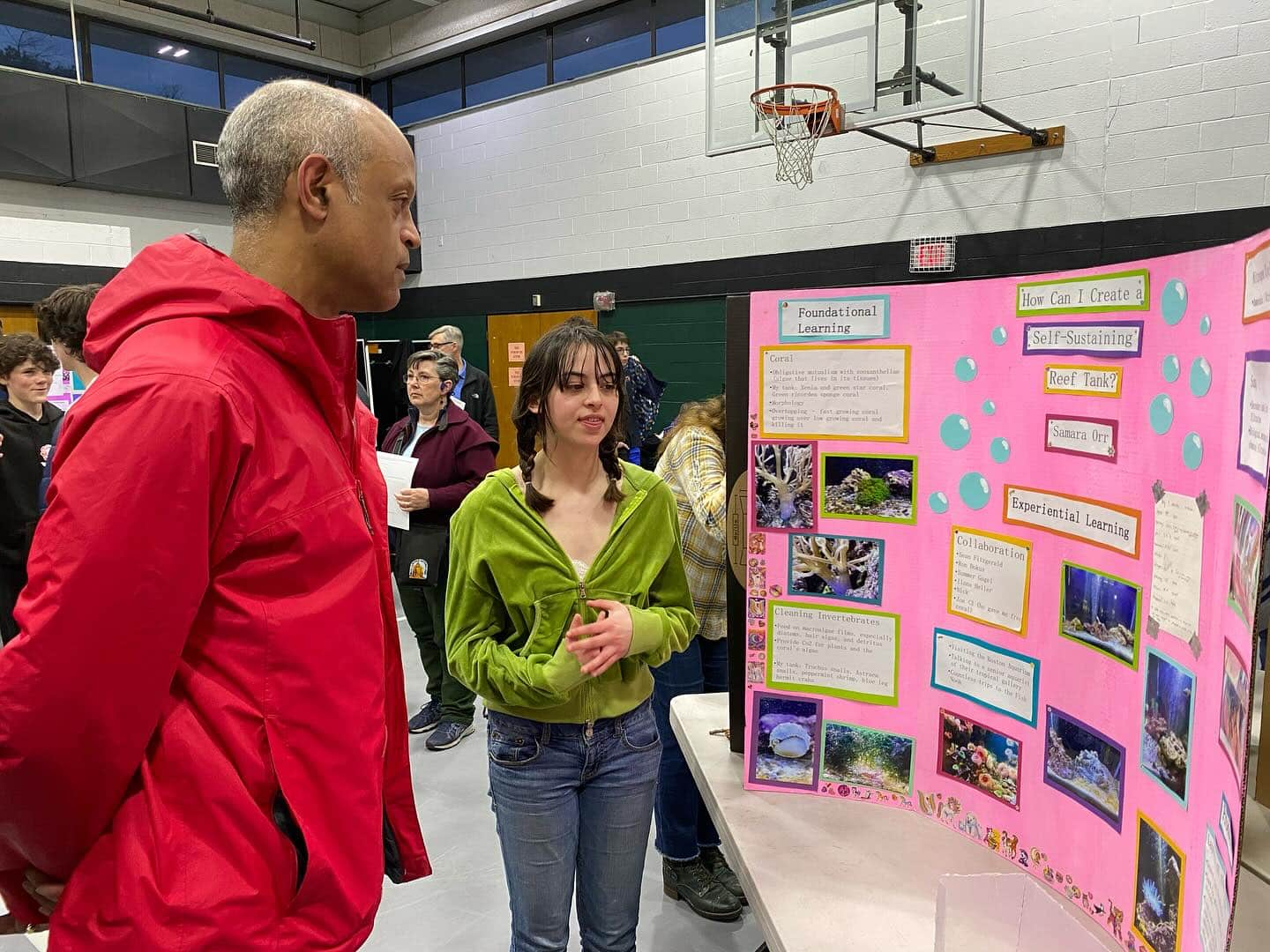
Entry Points for Other Schools
Wherever you are in your own practice, I hope you can take something from the example of the Parker School senior project and exhibition.
If you have an established tradition of something similar to the Parker senior project:
- How much autonomy do students have in deciding their topic?
- Where in your system do students practice the skills they need in the years leading up to the senior project?
- What kind of guidance do you provide to jurors to support them in contributing effectively?
If you are an educator new to senior project and student-centered learning communities:
- Instead of using grades that are about a performance at a set time and can’t be changed, have you tried using rubrics or competency progressions that allow students to revise and improve their rating as they grow in their competence?
- Could you carve out time for a passion project that lets students explore a topic of their choosing while learning transferable skills?
- Can you identify an authentic audience for a final product – whether other teachers, peers, or community members?
If you have another role – whether you work at a district or state level, are from a support organization, or are a parent or community member: How can you encourage or support schools to invest in creating powerful culminating learning experiences that allow students to showcase their learning, growth, and readiness?
Learn More
- Celebrating Readiness for the Next Challenge: Gateway at the Parker School
- CBE Starter Pack 2: Meaningful Assessment
- A New Framework to IMPACT Building a Defensible Body of Evidence
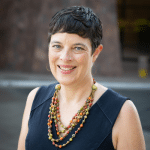 Laurie Gagnon is the CompetencyWorks Program Director at the Aurora Institute. She leads the work of sharing promising practices shaping the future of K-12 personalized, competency-based education (CBE). Each year since she has been in this role, she has made a trip to Parker for gateways or senior presentations. She sees the Coalition of Essential Schools Ten Common Principles, from which the Parker Charter Essential School draws its name and philosophy, as a predecessor to our current CBE definition. Laurie lives in Somerville, MA with her partner, young son, and cat.
Laurie Gagnon is the CompetencyWorks Program Director at the Aurora Institute. She leads the work of sharing promising practices shaping the future of K-12 personalized, competency-based education (CBE). Each year since she has been in this role, she has made a trip to Parker for gateways or senior presentations. She sees the Coalition of Essential Schools Ten Common Principles, from which the Parker Charter Essential School draws its name and philosophy, as a predecessor to our current CBE definition. Laurie lives in Somerville, MA with her partner, young son, and cat.